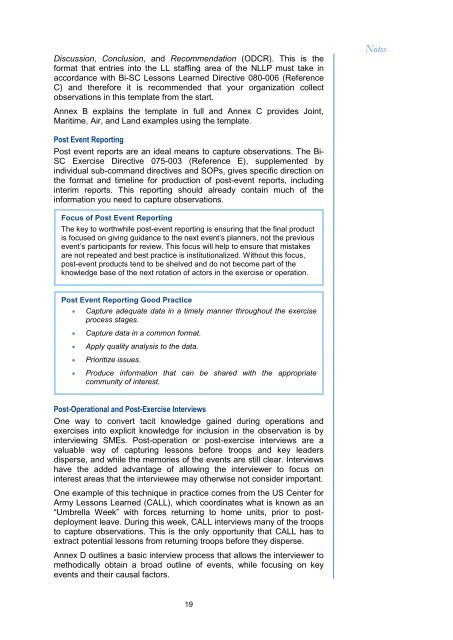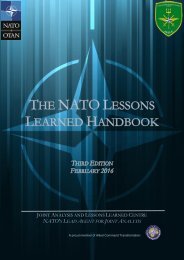JOINT ANALYSIS LESSONS LEARNED CENTRE NATO'S LEAD AGENT JOINT ANALYSIS
1ViofYb
1ViofYb
You also want an ePaper? Increase the reach of your titles
YUMPU automatically turns print PDFs into web optimized ePapers that Google loves.
Discussion, Conclusion, and Recommendation (ODCR). This is the<br />
format that entries into the LL staffing area of the NLLP must take in<br />
accordance with Bi-SC Lessons Learned Directive 080-006 (Reference<br />
C) and therefore it is recommended that your organization collect<br />
observations in this template from the start.<br />
Notes<br />
Annex B explains the template in full and Annex C provides Joint,<br />
Maritime, Air, and Land examples using the template.<br />
Post Event Reporting<br />
Post event reports are an ideal means to capture observations. The Bi-<br />
SC Exercise Directive 075-003 (Reference E), supplemented by<br />
individual sub-command directives and SOPs, gives specific direction on<br />
the format and timeline for production of post-event reports, including<br />
interim reports. This reporting should already contain much of the<br />
information you need to capture observations.<br />
Focus of Post Event Reporting<br />
The key to worthwhile post-event reporting is ensuring that the final product<br />
is focused on giving guidance to the next event’s planners, not the previous<br />
event’s participants for review. This focus will help to ensure that mistakes<br />
are not repeated and best practice is institutionalized. Without this focus,<br />
post-event products tend to be shelved and do not become part of the<br />
knowledge base of the next rotation of actors in the exercise or operation.<br />
Post Event Reporting Good Practice<br />
Capture adequate data in a timely manner throughout the exercise<br />
process stages.<br />
<br />
<br />
<br />
<br />
Capture data in a common format.<br />
Apply quality analysis to the data.<br />
Prioritize issues.<br />
Produce information that can be shared with the appropriate<br />
community of interest.<br />
Post-Operational and Post-Exercise Interviews<br />
One way to convert tacit knowledge gained during operations and<br />
exercises into explicit knowledge for inclusion in the observation is by<br />
interviewing SMEs. Post-operation or post-exercise interviews are a<br />
valuable way of capturing lessons before troops and key leaders<br />
disperse, and while the memories of the events are still clear. Interviews<br />
have the added advantage of allowing the interviewer to focus on<br />
interest areas that the interviewee may otherwise not consider important.<br />
One example of this technique in practice comes from the US Center for<br />
Army Lessons Learned (CALL), which coordinates what is known as an<br />
“Umbrella Week” with forces returning to home units, prior to postdeployment<br />
leave. During this week, CALL interviews many of the troops<br />
to capture observations. This is the only opportunity that CALL has to<br />
extract potential lessons from returning troops before they disperse.<br />
Annex D outlines a basic interview process that allows the interviewer to<br />
methodically obtain a broad outline of events, while focusing on key<br />
events and their causal factors.<br />
19



